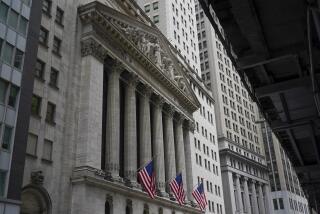Mergers Setting Pace to Break Record of 1994 : Buyouts: Deals in first three quarters total $564 billion worldwide--43% ahead of last year.
NEW YORK — Corporate marriages, propelled by high stock prices, ready financing and rising economies, are poised to shatter the record for mergers set last year.
Global mergers and acquisitions totaled $564 billion in the first nine months of the year, a 43% increase from a year earlier and just shy of the $575 billion in 1994, the full-year record, according to preliminary information from Securities Data Co., a Newark, N.J., company that tracks mergers.
“You could be looking at $700 billion worldwide” for mergers this year, said Bruce D. Fiedorek, chief of mergers at Morgan Stanley & Co., the leading adviser in acquisitions this year, with 119 transactions valued at $108 billion.
“It’s a hell of a year,” said Arthur J. Reimers III, the top mergers partner in London for Goldman, Sachs & Co. Goldman ranked second in mergers this year, working on 116 transactions valued at $93 billion.
The breakneck pace of corporate acquisitions is being fueled by low interest rates, increasing competition and changing regulations, investment bankers said. Meanwhile, record-high share prices give companies the currency they need to pay for purchases in stock-for-stock mergers.
Some examples from the third quarter:
* Chemical Banking Corp. and Chase Manhattan Corp. agreed to an almost $11-billion stock swap merger that would create the biggest U.S. bank.
* Walt Disney Co. is paying for its purchase of Capital Cities/ABC Inc. with $19 billion in stock and cash.
* Upjohn & Co. and Sweden’s Pharmacia plan to merge in a stock swap that would create the world’s ninth-largest drug maker, with market capital worth $13 billion.
These transactions are gravy for Wall Street, where earnings are rising after last year’s bond market debacle that caused profits to fall 81%.
Combined with higher earnings from underwriting stocks and bonds, trading revenue that’s in the black and a rise in mutual fund sales, the U.S. securities industry is enjoying one of its best years ever.
Morgan Stanley, whose merger clients include Chemical Banking, Pharmacia and Time Warner Inc.--which plans to purchase Turner Broadcasting System Inc. for $7.4 billion--said investment banking revenue rose 68% to $355 million in the three months ended in August. Much of the increase came from merger fees.
Advising in mergers is one of Wall Street’s most profitable activities. Firms collect millions of dollars in fees while putting little, if any, of their capital at risk.
Merger fees “can have a huge, huge impact” on Wall Street’s profits, said Douglas Grey, a portfolio manager at Pacific Financial Research in Beverly Hills, whose stocks include Bear Stearns Cos., Merrill Lynch & Co. and Morgan Stanley.
Goldman Sachs’ earnings for the third quarter quadrupled to $425 million, in large part because of merger fees, according to partners at the firm.
Lazard Freres & Co. and its overseas affiliates ranked third in Securities Data’s underwriting totals, advising in mergers valued at $74.6 billion.
CS First Boston came next with $64.5 billion. Merrill, Salomon Brothers Inc., Bear Stearns, James D. Wolfensohn Inc., J.P. Morgan & Co. and Lehman Bros. Inc. rounded out the top 10 list of mergers advisers.
Although mergers are on the rise, the fees companies pay Wall Street for its advice are shrinking, investment bankers said. More and more, negotiations are taking place directly between corporate leaders, leaving bankers out of the loop.
Disney, for example, called in Bear Stearns Cos. and James. D. Wolfensohn Inc. just 36 hours before its board voted on the Capital Cities merger, Disney officials said.
The bulk of merger activity, as usual, is taking place in the United States, where transactions totaled $302.8 billion so far this year, Securities Data said.
More to Read
Inside the business of entertainment
The Wide Shot brings you news, analysis and insights on everything from streaming wars to production — and what it all means for the future.
You may occasionally receive promotional content from the Los Angeles Times.










